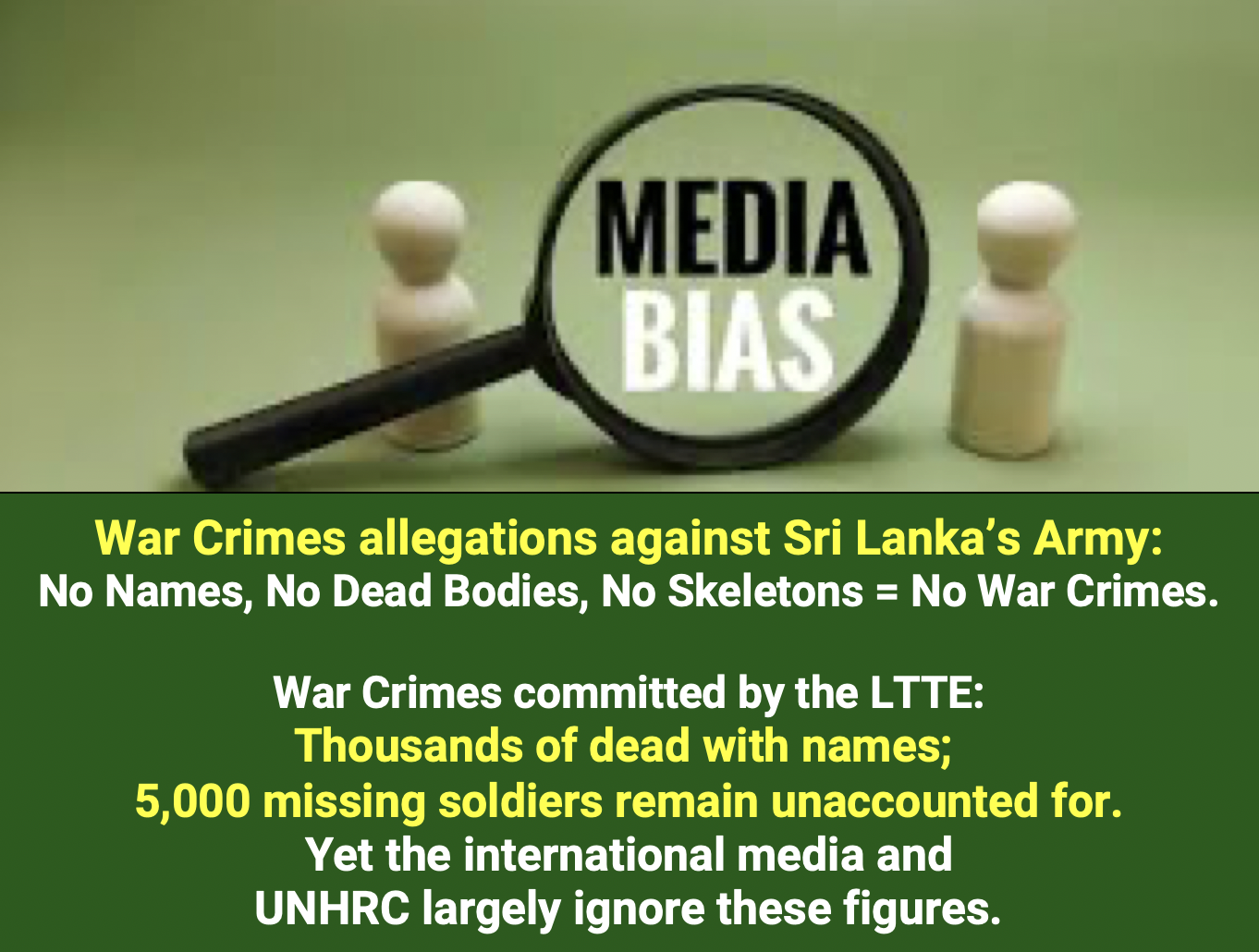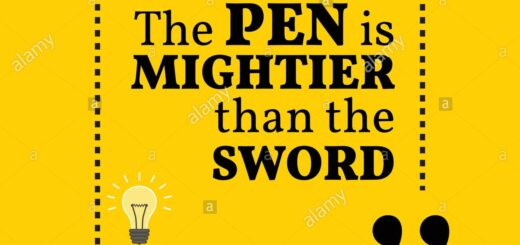What International Media must ask the UNHRC on Resolutions against Sri Lanka

For over sixteen years, the international media has largely abandoned its role as a global watchdog. Instead of questioning bias or demanding accountability from the UNHRC, it has allowed one-sided narratives to dominate — and in many cases, has played along. The world seems to have forgotten that Sri Lanka endured 30 years of terror under the LTTE, a proscribed terrorist group responsible for thousands of civilian deaths, assassinations, and massacres — crimes that have never received justice. Only after the LTTE was militarily defeated in 2009 did Geneva and the media begin scrutinizing Sri Lanka’s response, while ignoring the far larger question: how many innocents the LTTE killed, and why their lives remain erased from history.
In just three years (2006–2009), Sri Lanka ended a ruthless separatist terrorist movement and brought 300,000 civilians to safety from LTTE captivity. Yet the UNHRC failed to highlight this humanitarian achievement, choosing instead to criminalize the national army — the lawful forces acting to defend sovereignty and protect the people.
Even today, the oft-cited “40,000 civilian deaths” figure remains unverified — no names, no bodies, no skeletons, no forensic evidence — while documented LTTE massacres are downplayed. By contrast, US and NATO military campaigns that killed hundreds of thousands receive little scrutiny.
War Crimes allegations against Sri Lanka’s Army:
No Names, No Dead Bodies, No Skeletons = No War Crimes.
War Crimes committed by the LTTE:
Thousands of dead with names; 5,000 missing soldiers remain unaccounted for. Yet the international media and UNHRC largely ignore these figures.
Meanwhile, the narratives of war crimes — and even “genocide” — continue, despite population and casualty statistics clearly contradicting such claims.
The unavoidable question:
Why has the international media failed to demand balance, evidence, and accountability — and why has it amplified a selective narrative that demonizes Sri Lanka’s armed forces while ignoring LTTE crimes and Western atrocities?
Media has also conveniently chosen to avoid who created Tamil militancy, who first armed & trained them, who thereafter provided arms, ammunition & material assistance, who organized fund raising overseas. The international media is well aware of the answers but they all chose to keep silent and not reveal their names.
Having said that, the media must now demand answers.
On Ban Ki-moon, the Darusman Panel and the LLRC
- How can the UNHRC base resolutions on the Darusman “Panel of Experts” when it was a personal panel appointed by Secretary-General Ban Ki-moon (not a UNGA/UNSC-mandated inquiry), sent to the UNSG as an advisory report and later leaked— yet was never an official UN investigative mandate, nor intended to replace Sri Lanka’s own inquiries?
- Why did the UNSG commission that personal panel less than a month after Sri Lanka created the Lessons Learnt and Reconciliation Commission (LLRC) on 15 May 2010, thereby denying Sri Lanka’s own domestic process space to operate before Geneva launched an extra-mandate scrutiny?
- why was it deemed necessary for the UNSG to commission a personal panel immediately after a 30-year conflict ended — unprecedented in UN history?
Cross-exam one-liner:
- “Was Ban Ki-moon’s Darusman panel UN-mandated or a private SG advisory — and if private, why is Geneva treating it as a legal basis for resolutions?”
On Navi Pillay — recusal, ICC calls and mandate overreach
- Navi Pillay is of Tamil origin and has repeatedly taken political positions relating to Sri Lanka — why did she not recuse herself in line with nemo judex in causa sua(no one should be judge in their own cause)?
- Why was she allowed to publicly press for ICC referral-style responses (inviting States to seek Security Council action) — something the High Commissioner has no authority to order?
- If the High Commissioner’s job is neutral human-rights monitoring, why was Pillay permitted to lobby for constitutional outcomes (For example, advocating implementation of the 13th Amendment and urging ICC-style action against Sri Lankan officials?
Cross-exam one-liner:
- “Why didn’t Navi Pillay recuse herself given her Tamil background, and why was she allowed to urge ICC-style action that only the Security Council can order?”
On Prince Zeid — attacking Sri Lanka’s judiciary and pushing hybrid courts
- On what legal basis did Prince Zeid publicly declare Sri Lanka’s judiciary “not credible” and press for hybrid mechanisms/foreign judges, when the UNHRC has no treaty authority to impose or require foreign judges and Article 2(7) of the UN Charter which prohibits intervention in domestic jurisdiction?
- Does this not amount to prejudging institutions before Sri Lanka’s own processes run?
- If credibility of courts is the test, why did Zeid single out Sri Lanka while remaining silent about judicial collapses in states aligned with Western powers?
Cross-exam one-liner:
- “On what legal basis did Prince Zeid declare Sri Lanka’s judiciary ‘not credible’ and push for hybrid courts with foreign judges?”
On Michelle Bachelet — sanctions, prosecutions without mandate
- Why did Michelle Bachelet’s office recommend sanctions and criminal prosecutions of Sri Lankan officials on the basis of OHCHR reports, when the HRC has no prosecutorial mandate and sanctions are political measures decided by States or the Security Council?
- How is fairness served when similar or larger Western military operations that produced high civilian casualties (Iraq 2003, Afghanistan 2001, Libya 2011, Gaza 2008 onwards) did not prompt parallel UNHRC demands for sanctions or similar unilateral UN-driven prosecutorial measures.
Cross-exam one-liner:
- “Why did Bachelet recommend sanctions/prosecutions against Sri Lankan officials when OHCHR has no prosecutorial mandate?”
On Volker Türk — gravesite visits and prejudgment of unverified sites
- Why did Volker Türk include a visit to a 1990 gravesite (still under investigation with unknown victims/causes) in an official report — creating a narrative before forensic determination?
- Is it appropriate for a High Commissioner to draw public conclusions from unverified gravesites?
- Why did he not visit LTTE torture chamber sites documented by Tamil families where 3,000 Tamils were killed?
- Why did Volker Türk not critically examine the alleged 40,000 deaths at Mullivaikkal, where no bodies or forensic evidence exist?”
Cross-exam one-liner:
- “Did Volker Türk rely on independent forensic verification before publicising the 1990 gravesite in his report?”
On LTTE accountability — funding, diaspora NGOs and double standards
- If the LTTE was a proscribed terrorist organisation in many jurisdictions, why has Geneva largely treated the state as the primary wrongdoer while failing to hold LTTE networks and front NGOs accountable?
- Why are LTTE diaspora organisations given platforms in Geneva, while survivors of LTTE terror and evidence of child soldiers/human shields get ignored?
Cross-exam one-liner:
- “Why has the OHCHR not investigated LTTE funding networks and diaspora front organisations with the same vigour it applies to Sri Lanka’s armed forces?”
On evidence, sealed testimony, leaks and selective use of reports
- How can the UNHRC claim impartiality while relying on leaked reports, anonymous testimony, sealed files and unverifiable casualty estimates — but refusing to share primary evidence or allow forensic testing?
- If Geneva demands criminal investigations, why does it use evidence it will not disclose, denying Sri Lanka the right of reply?
Cross-exam one-liner:
- “How can Geneva demand accountability when it hides key evidence in sealed archives for decades, denying Sri Lanka a right of reply?”
On selective targeting & double standards
- Why has Sri Lanka been subject to 11 country-specific resolutions in Geneva, when Iraq, Afghanistan, Libya, Gaza, Yemen have not produced the same scrutiny?
- Is Geneva’s focus on Sri Lanka driven by law or by geopolitics/donor pressure?
Cross-exam one-liner:
- “Why has Sri Lanka faced 11 HRC resolutions while far bloodier conflicts in Iraq, Libya or Gaza have not?”
On funding, the 5th Committee and programmatic oversight
- Who is paying for OHCHR’s repeated Sri Lanka investigations, and why has the UN 5th Committee not exercised oversight of these budgets?
- Which donor states funded Sri Lanka-specific projects in OHCHR/OISL — and were political conditions attached?
- When peace has prevailed for 16 years with no LTTE resurgence, why are there still repeated resolutions — none even mentioning the need to protect Sri Lanka’s unitary state from separatism?
Cross-exam one-liner:
- “Which Member States funded repeated Sri Lanka investigations and why did the 5th Committee allow those budget lines?”
On remedy and sovereignty: hybrid courts, ICC referrals and who decides
- When High Commissioners advocate ICC referral or hybrid tribunals, are they not asking States to bypass complementarity and Security Council authority?
- Who in Geneva has the legal authority to demand such remedies?
Cross-exam one-liner:
- “Who in Geneva has legal authority to demand ICC referrals or hybrid courts — when that rests with the Security Council?”
The single, unavoidable question of pattern and credibility
- Taken together — the Darusman panel, Pillay’s ICC lobbying, Zeid’s judiciary attacks, Bachelet’s sanctions push, Türk’s gravesite politics, failure to investigate LTTE, sealed evidence, repeated budget authorisations — how can the UNHRC claim impartiality?
- Provide independent proof of neutrality, or admit to a pattern of sustained bias and explain what corrective steps Geneva will now take.
Cross-exam one-liner:
- “Given this pattern across successive High Commissioners, how can the HRC still claim impartiality on Sri Lanka?”
Moving to Closure
For over sixteen years, the UNHRC and portions of the international media have accepted and amplified unverified allegations against Sri Lanka, while ignoring evidence of LTTE atrocities and the lawful actions of the national army.
This persistent narrative has prevented closure, kept old wounds open, and allowed external actors to dictate the terms of memory, justice, and governance for a sovereign nation.
The UNHRC or international media did not end terrorism – Sri Lanka Armed Forces did
The UNHRC or international media did not stop child soldier recruitment – Sri Lanka Armed Forces did
The UNHRC or international media did not bring peace to Sri Lanka – Sri Lanka Armed Forces did.
It is time for Geneva — and the media that amplifies its resolutions — to acknowledge the limits of their authority and the gaps in their evidence, and to allow Sri Lanka and its people to move forward.
Closure requires:
- Recognizing the documented humanitarian and counter-terrorism successesof Sri Lanka’s armed forces.
- Providing a balanced historical record, giving due attention to LTTE crimes, missing soldiers, and civilian casualties under terrorist control and how LTTE was created & nurtured.
- Respecting Sri Lanka’s sovereignty, allowing domestic legal and reconciliation processes to function without external interference.
- Ending the repetition of unverified claims, so that ordinary Sri Lankans, who have lived through decades of conflict, can live without foreign-imposed stigma or fear of external diktats.
True accountability is achieved not by foreign-driven, selective condemnation, but by acknowledging facts, respecting national processes, and allowing people who live in Sri Lanka to reclaim their own narrative. Only then can Sri Lanka — move toward genuine closure.
Shenali D Waduge







